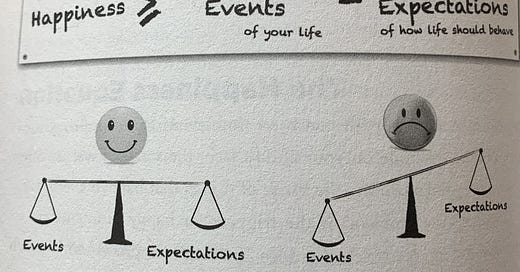Solve For Happy: Engineer Your Path to Joy by Mo Gawdet
Happiness is just about balancing the left hand side and right hand side of one fundamental equation for human flourishing that is within your control
Mo Gawdet is an engineer who worked at the highest levels of Microsoft and Google, but he spent many years doing so while miserable and depressed. Eventually he decided that enough is enough, and put his engineering brain to the problem in order to "solve for happy" and find a universal equation for human happiness. Years later his equation was put to the ultimate test when circumstances beyond his control led to the untimely death of his son Ali from a medical error during surgery.
Instead of giving up on ever finding happiness again and blaming the world for taking his son away, as many might be tempted to do under those circumstances, Mo decided to use his equation to deal with the tragedy and then to share his story with the world through this book.
I strongly identified with Mo because he also found his path through the loss of someone he loved, his own son (who have must have loved more than I loved my late friend and research brother, Justin) and his path was to try to share his pain with the world in a positive way. This seems quite similar to my reasons for starting this virtual mental health library in Justin's memory. Miss you Justin!
As a physicist currently working in an engineering department, I think Mo and I probably think more alike than the average two random humans. I found this book well organized, clear and very helpful.
I've read many mental health books (even before this project, just to deal with my own mental health) and most of the ideas in this book weren't new to me-Mo and I may have read some of the same books, I’d bet. But he presented the sum of what he learned in a clear and concise way that was organized to flow and connect everything way that was new to me.
Mo's equation is shown below in a photo I took of the most important page of this book.
Wow, I found the “Happiness Equation” so simple yet also profound. I've never seen the sort of fundamental problem of being human written in such a clear and concise manner. You can only be happy when the right hand side is either zero or positive, and the only way to do that is if your perception is greater than your expectations. Which is actually kind of the opposite of being an optimist, in some ways, if optimists confuse their hope for a certain preferred reality and their expectations of that reality coming to fruition.
How to go about solving for happy? Well, Mo's prescribed method is to:
Bust the 6 Grand Illusions
Fix the 7 Blind Spots
Hang on to the 5 Ultimate Truths
The 6 Grand Illusions are:
Thought
Self
Knowledge
Time
Control
Fear
The 7 Blind Spots
Filters
Assumptions
Predictions
Memories
Labels
Emotions
Exaggeration
5 Ultimate Truths
Now
Change
Love
Death
Design
What I really liked about this book is the way he clearly sketched out where he was going with the book from the very beginning, then at the beginning of every chapter beginning, he showed a map of where you were in his prescribed path. I found that very helpful and well organized.
The overall message of the Grand Illusions section was full of useful bits of information on why you should not listen to your thoughts, your ego, both in it's attachment to your sense of self and it's attachment to your desire to be right, why you should focus on the present instead of the past or future (which never exist in any present), why our attachment to feeling we are in control is ultimately harmful to us and why our fears are holding us back from living the lives we desire. The blind spots are mostly psychological processing systems that evolved to allow us to process information quickly, but which can be maladaptive when they lead us to wrong assumptions.
Finally, the ultimate truths are the big ticket, big picture ideas of life. Live in the now, change is inevitable and the only true constant in life, love is all you need, death is inevitable and the universe seems to have had a designer, at least, acccording to Mo's perception. That might be the more controversial part of the book for some strongly atheistic readers. I'm not a person of faith but I don't mind someone writing a book from deep in his heart and expressing his belief in a deity.
The most interesting part of that section of the book to me was when he said what my therapist has often said to me, that I should believe the story that makes me happy, rather than the story that makes me suffer, if I have the choice. Mo used that argument for why to believe in a deity, but my therapist has recommended that mindset for me in other topics. I’m not that good at believing what I want to believe, I’m just too skeptical, but I’m trying to learn how to change that mindset. But I think this is great advice if you can implement it in your life within your brain.
Oh, I forgot to add that I loved his video game model of reality. I came up with a Mario Brothers theory of everything myself, mostly because I like the idea and it is a helpful way of looking at the world, even if I don’t really believe in it.


